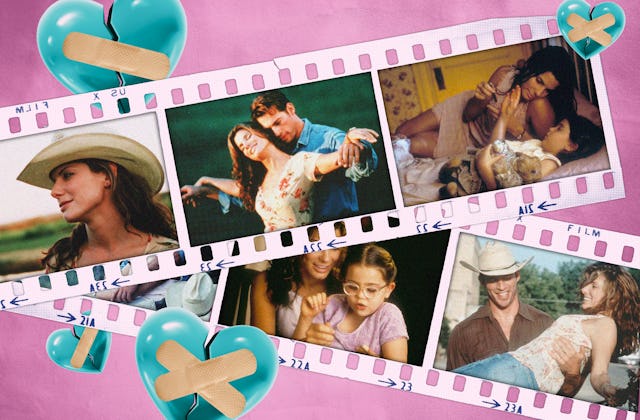This '90s Classic Is A Reminder That Sometimes Divorce Is Your Happy Ending
If Sandra Bullock and Harry Connick Jr. aren’t proof that starting over can be sexy, I don’t know what is.

The day I filed for divorce, I sat on the floor at my job and cried. It was my decision to end my short, youthful marriage, and I knew it was the right one. But at 25, it felt like the end of all my hopes and dreams. From the floor of my bookstore job, I looked up at a co-worker who was half a decade older than me, still trying to move on from his own divorce, and asked him if I was going to be OK. He didn't have an answer for me because he didn't have an answer for himself.
I did what most recently divorced semi-adults do: I moved home, I moped for a bit, I went a little wild, and then I turned out just fine — although it certainly didn't feel like that would be the case in the thick of it. It wasn't until, years later, I stumbled back across a classic '90s movie that something occurred to me: If I had watched Hope Floats immediately after my divorce, I would have found a very different message than I find now.
Released in 1998, the film tells the tale of life and love after divorce, painted in soft tones and backed by dreamy music. It ends with the quote, "Beginnings are scary; endings are usually sad. But it's the middle that counts the most. You need to remind yourself of that when you find yourself at the beginning. Just give hope a chance to float up. And it will, too."
When I first watched Hope Floats at 14, I felt bad for Birdee's daughter, Bernice, as she watched her mom "spin out of control” post-divorce. If I'd watched it at 25, the recently divorced me instead would have commiserated with Birdee, living out every 20-something's nightmare of "going home" and realizing you hadn't done much in your time away.
Now, past the scary beginning of my adulthood and nowhere near the usually sad end of my life, I see the film exactly as it's meant to be seen: a look at hope after heartbreak, the saving grace of a second chance, and an ode to the middle of everyone's stories.
Looking Back
If it's been a hot minute (or cold decade) since you settled in with the Sandra Bullock-Harry Connick Jr. romantic drama, you might need a bit of a refresher.
A Texas beauty queen (Birdee, played by Bullock) marries her high school sweetheart, Bill (Michael Paré), and moves to Chicago. She gives this man what she believes are the best years of her life. Then, Birdee's bestie dupes her into appearing on daytime television so she can announce she's in love with Bill and they're getting married. The audacity!
Birdee scoops up their school-aged daughter (Bernice, played by Mae Whitman) and flees back home to small-town Texas. There, she must face the self-serving version of herself from before, as well as the shell of a human she became trying to keep her husband happy. Along the way, she makes some pretty big mistakes at motherhood, hurts her mom a time or two, and begins a flirtation with hunky Justin Matisse (Connick) from high school.
Everyone has something to say about Birdee's situation, and no one is exactly reassuring. If your worst nightmare is returning to your hometown and living amongst the people you worked so hard to escape, you feel Birdee's pain.
Proof That Starting Over Can Be Sexy
The thing about divorce, as Hope Floats portrays it, is that it often only feels like the end when it's really just a beginning or a middle.
As Birdee heals herself and her relationship with her daughter, she goes from feeling like her life is over to realizing it's just begun. She finds herself practically love-drunk as she flirts with and eventually falls in love with Justin. And who could blame her?! If her ex, Bill, was the dream when she was just a girl in high school, Justin is the dream of every grown woman after.
When she alludes to looking "pathetic" on television, Justin sees the chance to flirt, telling her, "I preferred the part where you looked available."
Later, he tells her, "A dance is just a conversation between two people. Talk to me." (Whew, give a perimenopausal girl a fan or something.) That scene in the dance hall, where nearly everyone is wearing laughably identical hats, is why '90s girls put dancing abilities so high on their priorities list for future partners.
Later, they go from line dancing to slow dancing and, eventually, back to Justin's house. “I really don’t want you to kiss me right now,” Birdee says. Justin’s response? “Who said anything about kissing?” Hot damn.
Getting to the Good Stuff
Ultimately, Birdee's fresh start and hopeful "middle" remind me of what the decade post-divorce held for me.
I went off the rails for a bit and had the most fun of my life following a band around the country. I finished my degree and became one of the two things I always said I wanted to be: a writer. I swam in the Pacific, chased a grizzly bear around Yellowstone, and met several of my celebrity crushes from high school.
Then I met a boy, quite by accident, and eventually became the other thing I always said I wanted to be: a mom.
At a tipping point in Hope Floats, Birdee tells Bill she already got the absolute best of him, and it's the little girl watching them fight. And it's true; our kids are the absolute best of each of us. But you know what else is pretty damn good? The stuff that happens once you realize that sometimes divorce is your happy ending.